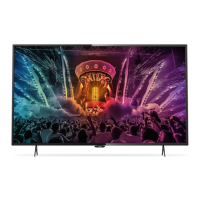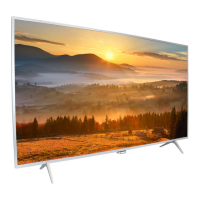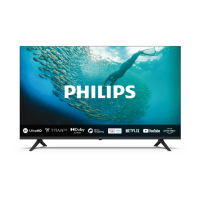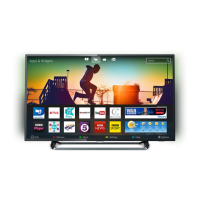Do you have a question about the Philips 43PFG5102 and is the answer not in the manual?
Connects the TV to the Internet for access to apps and online services.
Browse and download apps, tailored websites, and rental videos from an online store.
Watch movies from regional online video stores directly on your TV.
View and interact with social network messages on your TV screen.
Pause live broadcasts and record TV programs using a USB Hard Drive.
Review essential safety instructions before operating the TV.
Instructions for attaching the TV stand or preparing for VESA wall mounting.
Guidance on optimal TV positioning for viewing comfort and light conditions.
Instructions on connecting and handling the TV's power cable safely.
How to connect an antenna or signal from an antenna distribution system.
Connect the TV to a home network for Internet access via wired or wireless connection.
Guide to connecting external devices to the TV for optimal picture and sound quality.
Details on HDMI connections, including MHL and ARC features for high-quality audio/video.
Connect using component video cables for High Definition signals and audio.
Connect using composite video and separate audio jacks for standard definition signals.
Connect audio devices using a high-quality optical SPDIF connection.
Connect a set-top box or digital receiver to the TV for channel reception.
Connect an HTS for enhanced audio output via HDMI ARC or optical connections.
Connect mobile devices via MHL or USB for screen sharing and media playback.
Connect a Blu-ray player using an HDMI cable for high-quality playback.
Connect a DVD player using an HDMI cable for standard playback.
Connect headphones to the TV for private listening via the mini-jack output.
Connect game consoles via HDMI or component video for gaming.
Connect a USB Hard Drive for pausing and recording TV broadcasts.
Connect a USB keyboard for easier text input and navigation within menus.
How to turn the TV on, put it in standby, or switch it off completely.
Basic TV operations using the joystick key on the TV when the remote is unavailable.
Set the TV to automatically switch to standby after a preset time.
Identifies all buttons on the remote control and their primary functions.
Details on using the remote's built-in keyboard for text input and navigation.
Information about the infrared sensor for remote control signal reception.
Instructions for replacing the remote control batteries when they are depleted.
Guidelines for cleaning the remote control to maintain its finish and functionality.
Guide to searching and installing available TV and radio channels.
How to change channels using the remote, number keys, or channel list.
Information on viewing, filtering, and searching available channels.
Instructions for tuning to channels, using child lock, and setting age ratings.
How to create and manage lists of preferred channels for quick access.
Settings for displaying closed captions and selecting audio languages.
Information on viewing program schedules and required TV guide data.
Sources of TV guide information (broadcaster or Internet) and data availability.
How to navigate, tune to programs, view details, and change days in the TV guide.
Requirements and procedures for recording digital TV broadcasts using a USB Hard Drive.
Overview of the Home menu sections: Channels, Sources, Utilities, and Quick settings.
Steps to access and navigate items within the Home menu.
Overview of available TV functions and applications like Smart TV and TV guide.
Information on accessing the Netflix app and requirements for streaming.
How to select and switch between connected input devices and tuners.
Setting specific options for different TV input sources.
Rescanning and updating the list of available source connections.
Switching to ideal picture settings for gaming or computer use.
Instructions on launching the TV's built-in Internet browser.
Accessing additional features like bookmarks, security, and settings within the browser.
View photos, play music, and watch videos from connected USB storage devices.
Browse and play media files stored on a computer via the home network.
Navigating and sorting media files by type, date, or name.
Controls and options for playing video files, including playback and subtitle settings.
Viewing photos individually or as a slideshow with optional music.
Playing music files, managing playlists, and accessing track information.
Share your smartphone or tablet screen wirelessly with the TV using Wi-Fi Direct.
Connect mobile devices via MHL cable for screen sharing and charging.
Connect to the Internet for access to apps, online TV, and streaming services.
Using the TV as a client to stream programs from another Multi room server TV.
Requirements for Multi room function, including network connection and WoWLAN settings.
First-time setup and how to watch channels or recordings from a server TV.
Access to frequently used picture, sound, and eco settings for quick adjustments.
Adjusting picture styles, formats, color, contrast, sharpness, and enhancement settings.
Configuring sound styles, bass, treble, surround mode, and audio output settings.
Optimizing TV settings for energy saving, screen off, and automatic switch off timer.
Managing languages, clock, sleep timer, EasyLink, and USB keyboard/mouse settings.
Setting the TV's clock, time zone, and changing the menu language.
Enabling features for hearing, visually impaired, or deaf users, including audio description.
Updating, reinstalling, or redoing the full TV installation for channels.
Copying channel lists between TVs and checking current software versions.
Manually installing individual digital channels by frequency.
Instructions for switching service navigation on or off.
Procedures for updating TV software from the Internet or a USB flash drive.
Viewing the current TV software version and release notes.
Information for dealers and expert users on performing local software updates.
Details about the open-source software included in the television.
Statement regarding the distribution and licensing of open-source software.
Details on specific open-source licenses like FreeType, zlib, and libpng.
Information on saving energy, screen off, and switch off timer for environmental considerations.
Technical power specifications including voltage, temperature, and power-saving features.
Details on antenna input, TV systems, and video playback formats supported.
Specifications for screen size, resolution, and input formats.
Physical dimensions and weight of the TV with and without the stand.
List of available input/output ports including HDMI, USB, and network connections.
Audio specifications including output power, Dolby Audio, and DTS support.
Supported file systems, playback formats, codecs, and Wi-Fi certification.
Benefits of registering your TV for support, new product information, and promotions.
On-screen help system for finding information and downloading the user manual.
Guidance on common issues like power, remote control, picture, sound, and channels.
Accessing Philips' online support for troubleshooting and downloading software.
Contact information for support, repair services, and product identification.
Important safety instructions to prevent electric shock, fire, injury, and damage.
Guidelines for cleaning and maintaining the TV screen to prevent damage.
Legal terms, product warranty, and disclaimers regarding the use of the TV and its manual.
Trademark information for Dolby audio technologies used in the TV.
Trademark information for Mobile High-Definition Link technology.
Trademark information for HDMI interface and logo.
Trademark information for DTS audio technologies.
Trademark information for Microsoft Windows Media and PlayReady.
Trademark information for Wi-Fi CERTIFIED and related logos.
Trademark information for Kensington security products.
Acknowledgement of other registered and unregistered trademarks.
| Screen shape | Flat |
|---|---|
| Response time | - ms |
| Display diagonal | 43 \ |
| Display brightness | 280 cd/m² |
| Display technology | LED |
| Native aspect ratio | 16:9 |
| Supported video modes | 1080p |
| Display diagonal (metric) | 108 cm |
| Screen format adjustments | Zoom, 4:3, 16:9 |
| Motion interpolation technology | - |
| RMS rated power | 16 W |
| AC input voltage | 110 - 220 V |
| Power consumption (standby) | 0.5 W |
| Package depth | 160 mm |
| Package width | 1070 mm |
| Package height | 670 mm |
| Package weight | 9000 g |
| Camera included | Yes |
| 3D | No |
| Battery type | AAA |
| Bundled software | DTVi |
| USB ports quantity | 2 |
| Product color | Black |
| Panel mounting interface | 200 x 200 mm |
| Number of CVBS | 1 |
| Programming period | 8 day(s) |
| Firmware upgradeable via | Auto upgrade wizard, Network, USB |
| Tuner type | Analog & digital |
| Analog signal format system | NTSC, PAL |
| HDMI ports quantity | 3 |
| USB 2.0 ports quantity | USB 2.0 ports have a data transmission speed of 480 Mbps, and are backwards compatible with USB 1.1 ports. You can connect all kinds of peripheral devices to them. |
| Consumer Electronics Control (CEC) | EasyLink |
| Audio formats supported | AAC, MP3, WAV, WMA |
| Image formats supported | BMP, GIF, JPG, PNG |
| Video formats supported | AVC, AVI, H.264, MKV, MPEG1, MPEG2, MPEG4, VC-1, WMV9 |
| Video compression formats | AVC, AVI, H.264, HEVC, MKV, MPEG1, MPEG2, MPEG4, VC-1, WMV9 |
| Subtitle formats supported | ASS, SMI, SRT, SSA, SUB, TXT |
| Operating temperature (T-T) | 5 - 35 °C |
| Cables included | AC |
| Depth (with stand) | 193.9 mm |
|---|---|
| Height (with stand) | 623.6 mm |
| Weight (with stand) | 8580 g |
| Depth (without stand) | 86.8 mm |
| Width (without stand) | 968.2 mm |
| Height (without stand) | 562.4 mm |
| Weight (without stand) | 8450 g |











